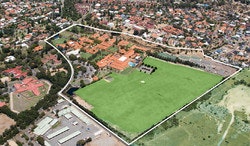Year 11 Geography ATAR
Overview
The Geography ATAR course provides a structured, disciplinary framework to investigate and analyse a range of challenges and associated opportunities facing Australia and the global community. These challenges include rapid change in biophysical environments, the sustainability of places, dealing with environmental risks, and the consequences of international integration. The course aims to develop students' understandings, skills, knowledge and values to ensure they are well placed for tertiary study and/or employment.
Topics
Unit 1: Natural and ecological hazards
The management of hazards and the risk they pose to people and environments.
By the end of this unit, students:
- understand the nature and causes of natural and ecological hazards
- understand the nature of the risks to be managed, such as loss of property/life, effects on infrastructure, jobs, economy, and physical and mental health
- understand that places and environments are influenced by both natural and ecological hazards
- understand the complexity of human-environment interdependence in relation to natural and ecological hazards
- demonstrate a knowledge of the concept of risk management
- understand and apply key geographical concepts - including place, space, environment, interconnection, sustainability, scale and change - as part of a geographical inquiry
- apply geographical inquiry skills and a range of other geographical skills, including spatial technologies and fieldwork, to investigate natural and ecological hazards
- compare and evaluate Australian and international risk management policies, procedures and practices.
Unit 2: Global networks and interconnections
Global interconnections, economic and cultural transformations and their political and social consequences.
By the end of this unit, students:
- understand the nature and causes of international integration and its spatial, economic, political and social consequences
- understand the ways people embrace, adapt to and resist the forces of international integration
- understand and apply key geographical concepts - including place, space, environment, interconnection, sustainability, scale and change - as part of a geographical inquiry
- think geographically, based on an understanding of the complexities of an increasingly interdependent world
- apply geographical inquiry skills and a range of other geographical skills, including spatial technologies and fieldwork, to investigate the complexity of the integrated world
- evaluate the sustainability of alternative futures, drawing on an understanding of an integrated global society.
Assessments
Geographical Inquiry: 20% | Fieldwork & Practical Exercises: 20% | Short/Extended Responses, including In-class essays: 30 % | Examinations: 30%
Reporting
A grade will be assigned following the completion of the course unit.
|
Grade
|
Interpretation
|
|
A
|
Excellent achievement
|
|
B
|
High achievement
|
|
C
|
Satisfactory achievement
|
|
D
|
Limited achievement
|
|
E
|
Very low achievement
|
Each grade is based on the student's overall performance for the course unit as judged by reference to a set of pre-determined standards. These standards are defined by grade descriptions.
Student Expectations/Homework
Students will be expected to complete approximately 2.5 hours of homework each week. This time should be spent consolidating material covered in class as well as any assigned tasks.
